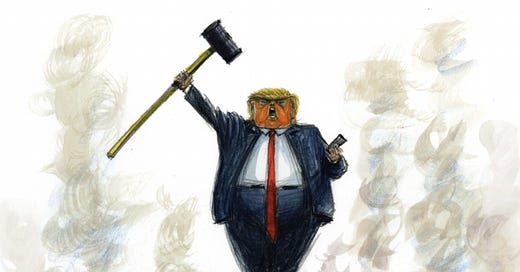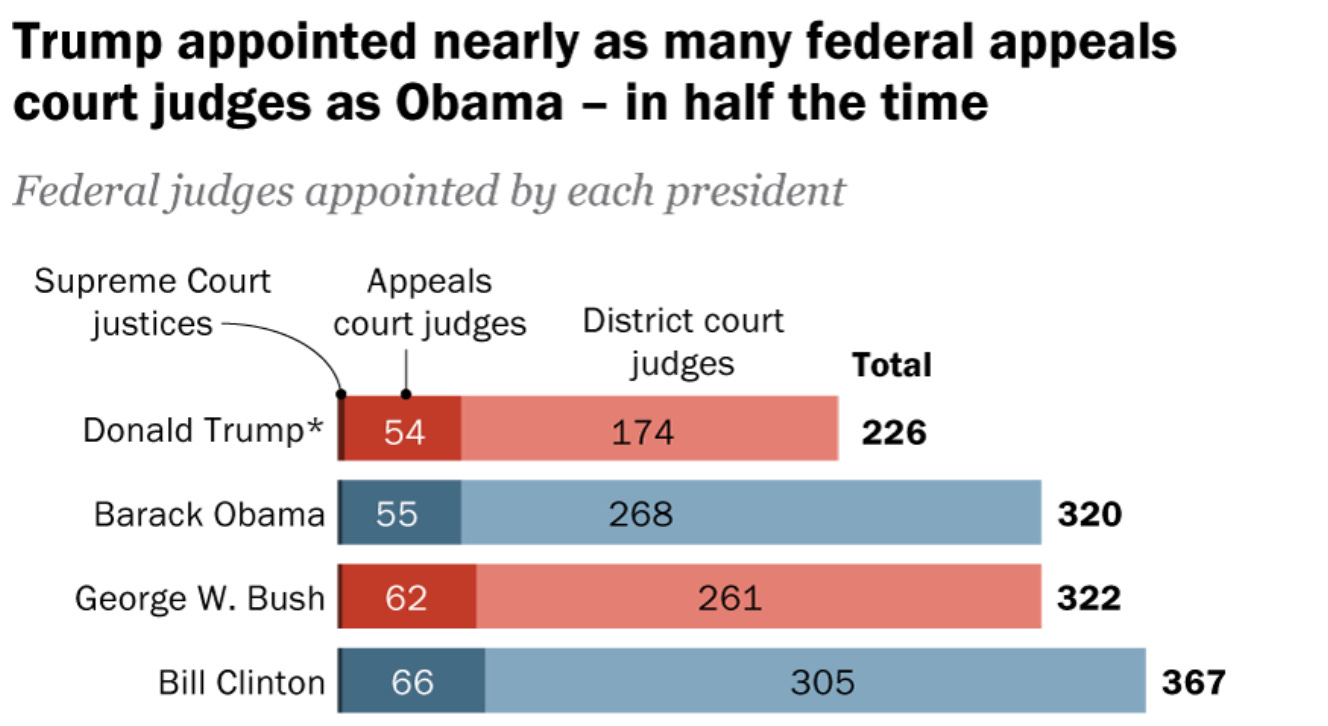Donald Trump’s mentor was the late Roy Cohn, a sketchy lawyer whose other famous clients included red-baiter Joseph McCarthy and mobster Anthony “Fat Tony” Salerno. Eventually disbarred, Cohn clearly enunciated his legal worldview: “I don’t want to know what the law is, I want to know who the judge is.”
In other words, ignore laws. If caught, fix the judge or have him thrown off the case, then find a cooperative one. Cohn also knew his way around. In 1983 he helped Trump’s older sister, Maryanne Barry, obtain an appointment as a U.S. District Court judge from President Ronald Reagan. She eventually became a Federal Appeal Court judge.
In 2016, Trump brought the Cohn culture into the White House, creating the most lawless administration in history. That’s publicly acknowledged, but what’s under-appreciated is that the Trump-inspired attack on the judiciary and the rule of law has been unprecedented and is ongoing.
We all know the history. Trump has thrown out or ridden roughshod over laws, judges, and prosecutors and politicized the judiciary more quickly than have other Presidents. Seven of his closest advisors were criminally charged. Last month, his company and CFO were criminally charged with serious tax offenses and other investigations continue. This week, the chair of his 2017 inaugural committee was arrested with others for conspiracy to influence foreign policy on behalf of Arab interests and obstruction of justice. He was impeached twice and incited a riot on January 6. And now, out of office, he masterminds attacks against the ballot box and the bench.
No sooner did he take over the Presidency than he focused on suborning the nation’s legal system. His first Attorney General Jeff Sessions did his bid for months, including the wholesale firing of dozens of prosecutors, dropping cases against loyalists, and imposing a hiring freeze at the Justice Department. Then the two fell out after Sessions recused himself from investigations into Russian interference in the 2016 election and was thrown out of Trump’s inner circle, then belittled, and badmouthed, until he resigned in 2018.
Trump then set records in terms of judicial appointments based strictly on ideological or partisan lines. He appointed three Supreme Court Justices and replaced 226 Federal Court judges, outpacing, in one term, his two-term predecessors. He and his fellow Republicans have also thrown out Democratic state legislatures, state-level attorneys general, sheriffs, and thousands of electoral adjudicators —- from those who serve on elections commissions to lower-level officials who supervise polling operations such as voter identification procedures, balloting processes, appeals, and recounts. He’s misled the public about the election result and refused to concede.
When he entered the White House, in January 2017, there were 816 active judges serving in the three tiers of the Federal Court System: the Supreme Court, 13 regional Appeals Courts, and 94 District Courts. Besides appointing three of the nine sitting Supreme Court justices, he replaced 30 percent of the nation’s active Appeals Court judges and 27 percent of active District Court judges. These Appellate Courts are powerful and Trump’s appointments were aimed at throwing out and replacing Democratic appointees with conservative ideologues.
Rigging the judiciary dovetailed nicely with the Republican drive to gain control over state legislatures. Republicans now control 32 of the 50 state legislatures and this year states can “redistrict” or redraw their district maps to gerrymander or facilitate more Republican victories at the state level and in the House of Representatives too.
Gerrymandering had already taken its toll in terms of ballot box equality. A University of Southern California report in 2019 report concluded that after the 2018 elections, 59 million Americans lived in 10 states that were under “minority rule” -- i.e. states where the party that lost the popular vote ended up with the majority of state legislative seats. It added that this was because the “state legislative lines were drawn by a state legislature, or by a partisan-leaning politician committee.”
(For instance, Republicans in Arkansas won 58.5 percent of the votes cast for State House representatives but won 76 percent of seats. Republicans in Kentucky won 57.9 percent of the votes cast for their State Senate representatives but won 89.5 percent of seats. There are a dozen more extensively gerrymandered states.)
Such cheating has riddled American history but was tempered in 1965 to protect minorities by the Voting Rights Act which required states to get federal approval for any redistricting or voting laws. But in 2013, this was thrown out by a Republican-controlled U.S. Supreme Court and this year Republican legislatures have unleashed hundreds of voting restriction bills in states across the country plus upended electoral processes and thrown out adjudicators.
In the 2020 election, Republicans concentrated mostly on winning state legislatures where unfettered redistricting in 2021 would allow them to pick up friendly seats – a strategy that will likely hand over control of the House of Representatives to the Republicans in 2022 and facilitate Donald Trump’s comeback in 2024, or whoever seizes his autocratic mantle.
Worse, Republicans have been stacking local courts, county election boards, and election officials with loyalists to attack the validity of votes both before and after the fact. This will guarantee that, in the future, close elections (and most are) will trigger disputes and endless recounts plus uncertainty, possibly lasting months, not just for days or weeks.
This is why last week Fitch Ratings, a credit rating company, announced it was considering downgrading the AAA rating of United States government bonds. The problem was not the economy, said Fitch’s report, but politics. “The failure of the former President to concede the election and the events surrounding the certification of the results of the Presidential election in Congress in January, have no recent parallels in other very highly-rated sovereigns. The redrafting of election laws in some states could weaken the political system, increasing divergence between votes cast and party representation. These developments underline an ongoing risk of lack of bipartisanship and difficulty in formulating policy and passing laws in Congress.”
Put another way, America’s judiciary and electoral processes are being thrown under the bus. And this does not mean that fairness is coming. It means that winter is coming.
My newsletters will arrive in your inbox Monday and Thursday mornings







Ouch........
The US is a manifest of the seven kingdoms. We have the white walkers (KKK), The wildings or Free folk who " recognizes no inherent or hereditary political authority", and those south of the Texas wall as the "kneelers". We do need a John Snow to take over and save us all and who would love to do that , the one and only savior of the human race Xi Jinping.